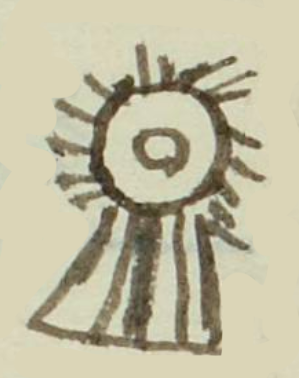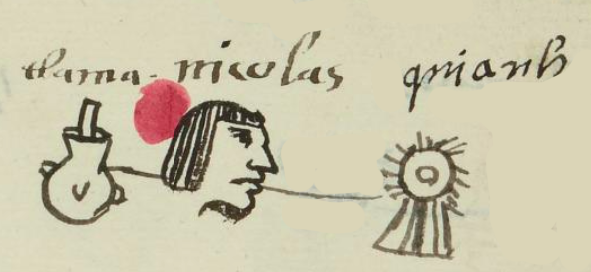Quiyauh (MH833v)
This painting of the simplex glyph for the personal name Quiyauh (“It Has Rained,” attested here as a man’s name) shows a frontal view of a stream of water. A single stream such as this, with a droplet/bead at the end (with its tiny concentric circle), is usually turned around, with the drop at the bottom, although there are other cases such as this one. The stream being triangular is also common, as are the thick and thin black lines suggesting current (movement). The tiny lines emanating off of the droplet/bead are somewhat rare for quiyahuitl glyphs.
Stephanie Wood
The little lines coming off the droplet or bead (perhaps the chalchihuitl, jade bead) suggest shimmer, attributes that coincide with beads and with tonalli (as the solar energizing force). The chalchihuitl shimmer, however, more often seems to take the shape of four small circles evenly placed around the central bead.
Quiyauh was a calendrical name, coming from the 260-day divinatory calendar. Normally, it would have a companion number from 1 to 13 with it. But, because of colonial edicts to stop using the tonalpohualli as a source for names, one thing that happened is that the companion numbers were dropped, perhaps as a stopgap measure to reduce the sacred nature of the name. See Norma Angélica Castilla Palma, "Las huellas del oficio y lo sagrado en los nombres nahuas de familias y barrios de Cholula," Dimensión Antropológica v. 65 (sept.-dic. 2015), 186.
Stephanie Wood
1560
Jeff Haskett-Wood
water, rain, lluvia, día, calendario, tonalpohualli, brillar, gotas de agua, cuentas, nombres de hombres

quiyahu(itl), rain and a day name, https://nahuatl.wired-humanities.org/content/quiyahuitl
Lluvia
Stephanie Wood
Matrícula de Huexotzinco, folio 833r, World Digital Library, https://www.loc.gov/resource/gdcwdl.wdl_15282/?sp=741&st=image
This manuscript is hosted by the Library of Congress and the World Digital Library; used here with the Creative Commons, “Attribution-NonCommercial-ShareAlike 3.0 License” (CC-BY-NC-SAq 3.0).











